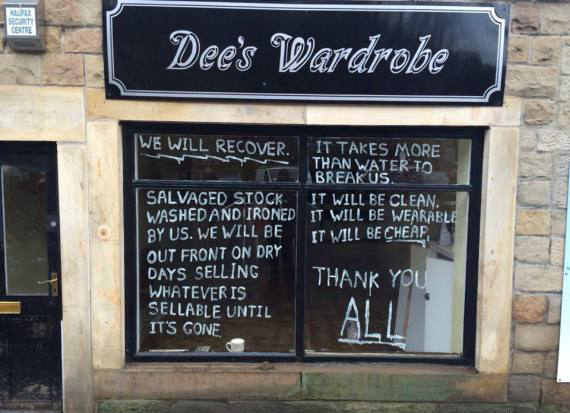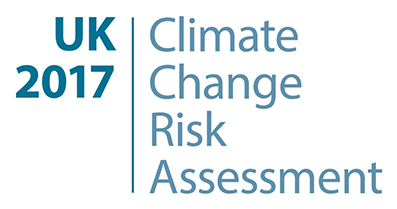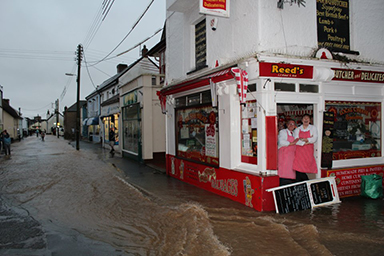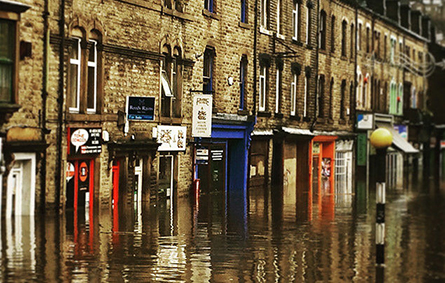Professor contributes to national Climate Change Risk Assessment

Tue, 20 Sep 2016 14:49:00 BST
Professor Bingunath Ingirige specialises in the resilience of small-to-medium enterprises in times of natural disasters like flooding
 LATEST Met Office forecasts are that UK winters will get 30 per cent wetter, meaning that even more areas will be at risk of devastating floods on the scale experienced by York and Hebden Bridge at the close of 2015. Local economies can be badly hit, but a professor at the University of Huddersfield has been researching ways in which small-to-medium businesses – often the lifeblood of their communities – can protect themselves and quickly recover from flood damage.
LATEST Met Office forecasts are that UK winters will get 30 per cent wetter, meaning that even more areas will be at risk of devastating floods on the scale experienced by York and Hebden Bridge at the close of 2015. Local economies can be badly hit, but a professor at the University of Huddersfield has been researching ways in which small-to-medium businesses – often the lifeblood of their communities – can protect themselves and quickly recover from flood damage.
Professor Bingunath Ingirige, (pictured right) of the University’s Global Disaster Resilience Centre, has published many of his findings and is one of the team of experts who have compiled the 2017 Climate Change Risk Assessment (CCRA), published every five years by the Committee on Climate Change (CCC) – an independent, statutory body established under the Climate Change Act.
 The report had its launch at a special Westminster event attended by its authors – including Huddersfield’s Professor Ingirige – and by politicians including Wakefield MP Mary Creagh, who chairs Parliament’s Environmental Audit Committee.
The report had its launch at a special Westminster event attended by its authors – including Huddersfield’s Professor Ingirige – and by politicians including Wakefield MP Mary Creagh, who chairs Parliament’s Environmental Audit Committee.
The CCRA spells outthe most urgent risks arising for the UK from climate change. They include periods of too much or too little water, increasing average and extreme temperatures, and sea level rise, with risks to communities, businesses and infrastructure. Professor Ingirige collaborated on the chapter that deals with business and industry.
It appraises the various risks that climate change poses to business, with flooding deemed to be the most urgent. Among the conclusions are that:
“More action is needed to ensure that businesses have the right incentives, information and tools to adapt. An enhanced response is required from both government and the private sector to adopt sustainable drainage systems, ensure access to resilient infrastructure, and implement other business continuity efforts. Measures such as business continuity plans are cost-effective to implement, while other measures will help to reduce vulnerability now and to retain flexibility given the uncertain increase in future flood risk”.
Impact of floods
 Professor Ingirige was invited to contribute to the CCRA because of his impressive track record in researching flooding and the risks it poses to local economies. A key speciality is the resilience of small-to-medium enterprises (SMEs).
Professor Ingirige was invited to contribute to the CCRA because of his impressive track record in researching flooding and the risks it poses to local economies. A key speciality is the resilience of small-to-medium enterprises (SMEs).
“Small businesses perform a very important role. They are a major part of the economy and you really need to protect them,” he said. “Some towns are organised around these small businesses and if one closes down, that affects a significant part of the community.”
Sri Lankan-born, Professor Ingirige was motivated to specialise in the impact of floods by the tsunami that devastated his homeland in 2004, although he had relocated to the UK by the time it struck. He continues to collaborate with some of the Government institutions in Sri Lanka in funded research into reconstruction and housing after disasters as Sri Lanka has faced several devastating flood events and landslides during the last few years.
Based at the University of Huddersfield’s School of Art, Design and Architecture since June 2016, his academic career has included research projects funded by bodies that include the Royal Institution of Chartered Surveyors (RICS), the Chartered Institute of Building (CIOB), the European Union under the Horizon 2020 scheme and the Engineering and Physical Sciences Research Council (EPSRC).
 One of his outputs is titled Investigating SME Resilience to Flooding. It is an EPSRC-backed report on the impact of flooding in the Devon town of Braunton and includes case studies of businesses and the strategies they adopted to increase their resilience. They include simple but effective measures such as installing raised electrical sockets, ensuring that valuable equipment and stock is kept a higher level, and protecting plaster with inexpensive and easily replaced wooden panels and such other simple and cost effective retrofits, which the SMEs can undertake to get back into business sooner after a flood event.
One of his outputs is titled Investigating SME Resilience to Flooding. It is an EPSRC-backed report on the impact of flooding in the Devon town of Braunton and includes case studies of businesses and the strategies they adopted to increase their resilience. They include simple but effective measures such as installing raised electrical sockets, ensuring that valuable equipment and stock is kept a higher level, and protecting plaster with inexpensive and easily replaced wooden panels and such other simple and cost effective retrofits, which the SMEs can undertake to get back into business sooner after a flood event.
“There are so many simple things that can be done to improve the SME preparedness and planning, which are predominantly very softer in nature, such as data back-up systems and having a customer relationship management system, so that whatever disaster happen you wouldn’t lose any of your customers,” said Professor Ingirige.
He will now closely engage with several of the stakeholders in the CCRA process and he will take part in a workshop later in the year.







